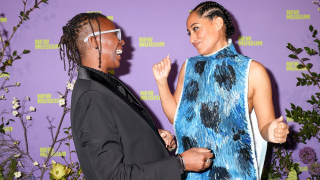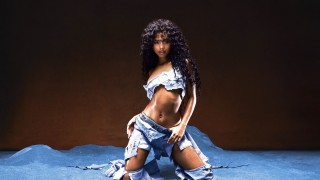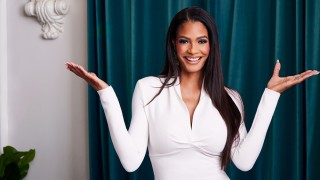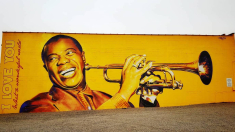Bishop T. D. Jakes is on a mission. A mission to empower, inspire and uplift the Black community. And, mission accomplished. Appropriately named America’s Best Preacher by Time magazine, Bishop Jakes is a spiritual leader and media mogul spreading his positive messages of faith to the masses. From TV, music, magazines, New York Times-bestselling books and conferences, Jakes has become a beacon of light serving the African-American community through his faith-based messages.
And Jakes definitely keeps himself busy. He’ll finally bring his popular MegaFest to his homebase of Dallas, Texas, its first time in the United States since 2006. Never been? MegaFest (running August 29-31) is a family-centered empowerment festival that comprises Jakes’s most popular conferences: ManPower, Woman Thou Art Loosed, MegaYouth and MegaKidz. The festival is so “mega,” it’s has attracted the likes of Oprah Winfrey, Jennifer Hudson and Kerry Washington.
Did we forget to mention his new show, Mind, Body, and Soul, debuting this fall on BET? Let’s hear him tell it. EBONY.com catches up with Bishop T.D. Jakes, discussing MegaFest, his BET series, and the plights facing the Black community.
EBONY: How does it feel to finally host MegaFest in your homebase?
T. D. Jakes: It’s incredibly exciting. It will be my first time having it in Dallas, on my own turf where my base is as it relates to my membership, in addition to my peripheral staff. To be able to draw people back into my base, back into my city where I have relationships with the mayor and the governor, gives us a sense of stability as we host a meeting of this magnitude.
EBONY: Why was it important for you to incorporate a Faith and Family Film Festival into MegaFest?
TDJ: We’ve been dibbling and dabbling in entertainment for quite some time now, and there’s not a lot of film festivals focused on faith and family based films. And yet when we get in the trenches, we see a lot of people that are interested. This festival creates an opportunity for scriptwriters, actors [and] artists to have an opportunity to meet people who do this on a daily basis. You’re going to have agents from William Morris, representatives from Sony, people who are currently making movies and on television, to be on panels, as well as marketing experts who can talk about marketing to the faith-based community.
Hollywood has a very narrow perspective as to what they think will be amenable to the African-American community, and that is primarily limited down to comedies. And why comedy certainly has a welcomed audience for minorities, I think there are other things that can be done in film as it relates to drama, suspense, action, etc., if they are done correctly. If there are proper budgets allocated in order to be competitive, I think you can produce a film that will attract minorities as well as the general populace. I would like to see that evolution begin to occur in the conversations in Hollywood.
EBONY: You have a new talk show, T. D. Jakes Presents: Mind, Body, and Soul, coming to BET this fall. How did the partnership arise?
TDJ: I thought that BET was good business partners for us. We have a shared base of followers between BET and T. D. Jakes Enterprises followers. I see the partnership with BET as more than an introduction of a talk show, but a partnership between brands where we can do future projects together down the road. I see this more than a one-off opportunity, but a birthing of a relationship between two bigger enterprises.
EBONY: Do you think the audience will be receptive to it?
TDJ: I really don’t know. I think that there is a market for it. I think there is an audience for it. I think that our show will be provocative and entertaining. But the public today is going through a major transition of what they are interested in. So we’re going to put it out there and see. I’m interested in it, and the people [who] have attended have loved it. I think it’s a great show, and we’ll see in the fall. I’ve interviewed LL Cool J, Steve Harvey, etc.
EBONY: How do you feel about shows like Preachers of L.A. or reality shows for the faith-based community?
TDJ: I think we are a spiritual people by nature. I think there’s a wide range of people within the African-American community that may not go to church, or related to somebody that does, and had some experience within the church, and they find it fascinating. It is perhaps the final frontier for entertainment. Some of the shows, I think, can be positive and some are not positive. As it relates to Preachers of L.A., I can’t comment on it because I haven’t seen it yet.
I hope we don’t entertain ultimately at the expense of ignoring the many actors and actresses who have given their lives to intense training to entertain us at the expense of their careers, and instead dumb down the opportunities to just reality shows. I certainly think that there’s a market for it. But I think that we are not monolithic and there needs to be a wide range of expression within our community so we don’t become narrowly defined by one perspective of who we are. Since we are defined by what other people see on television, it is extremely important that we show them the vast array of what it means to be an African-American, and not just one perspective.
EBONY: When you see different scandals in the media that occur within the church, do you ever feel as though it discredits your work and what you do for your community?
TDJ: Ultimately, I don’t. I think everybody has to build their own brand and define themselves in the community. It’s always unfortunate when people have more failures, but people are people, and we all have failures. It’s no different being clergy then it is within media, in Congress, politics, or even the White House. We will always have scandals wherever there are people. Thankfully we don’t come to worship people, we come to worship God. The more people are God-centered and less human-centered, the more effective the church will be.
EBONY: What would you define as the most crucial issue that faces the Black community?
TDJ: Well, there are two. The first is the deterioration of the family. It doesn’t have to be a perfect or picturesque family, but some support group that you can go home to and feel safe. We’ve lost big mama, Madea and those people who spoke wisdom into our lives. Our women are working two and three jobs trying to make ends meet. The men that are working in the family are often weary by the storms they’re facing outside the house, and also storms in the house. We have got to get the family thing back.
The reason I couldn’t narrow down on one issue is because, equally as dangerous is education. If you don’t have the education, you are exempt from opportunities like never before. When I grew up, in my generation you could get a good job working in the coal fields in West Virginia or the steel mills in Pittsburgh. You could get in the industrial and make a good living and live happily ever after.
Now technology has moved along to the point that, with the Information Age, if you don’t have education, you are exempt from major opportunities. Hopelessness leads to crime, leads to self-hatred, leads to self-loathing, because people are in a pit they can’t get out of. Education is important, and family is important. If we can build those two things back, we have fists to fight with to be able to move our generation towards the American Dream that we all believe in and want to participate in.
Kimberly N. Wilson is a NYC-based lifestyle/entertainment writer and digital strategist. She is a graduate of the University of Maryland, College Park and completed her juris doctor from Howard University School of Law. Follow her on Twitter @kimberlynatasha.













